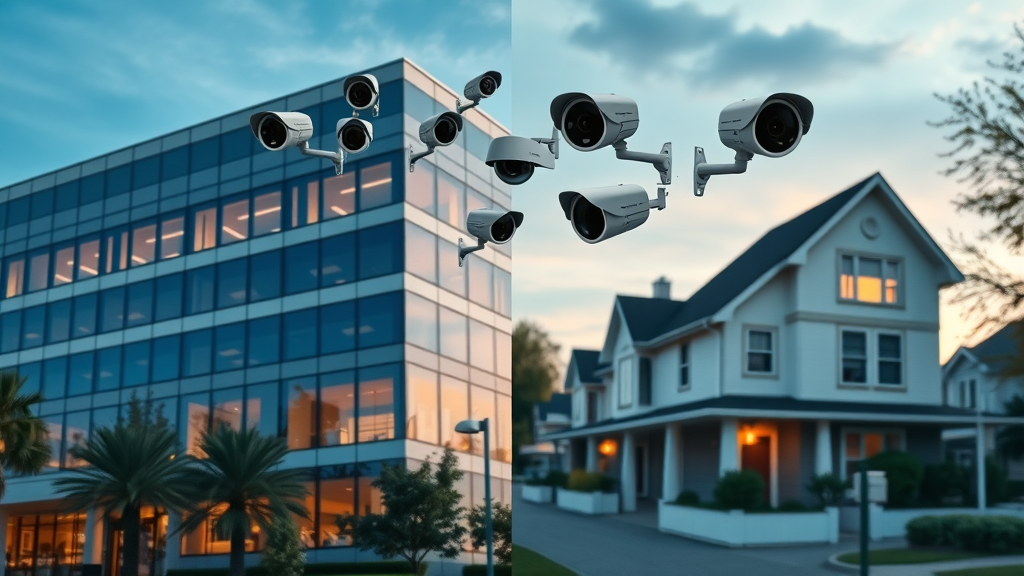Did you know that over 67% of businesses in the US depend on security cameras as part of their primary security strategy? Whether you’re looking to safeguard your home or protect a bustling office, understanding the cctv pros and cons is crucial before installing any system. This comprehensive guide offers expert insights, practical examples, and clear comparisons, ensuring you make a well-informed choice for your security needs.
Startling Statistics: Understanding the True Impact of CCTV Pros and Cons
The rising adoption of security cameras and surveillance systems has dramatically transformed modern security. According to recent industry studies, nearly two-thirds of all medium and large businesses include some form of cctv camera system as a core component of their operations. This shift isn’t limited to commercial spaces; residential CCTV installations have also surged, showing an uptick as homeowners strive for increased peace of mind.
However, while these numbers are impressive, the pros and cons of video surveillance remain a fiercely debated topic. For every compelling case study of crime deterrence, there are valid concerns about privacy invasion and ethical boundaries. As the statistics show greater CCTV deployment, it’s essential to look beyond the numbers—balancing security measures with responsible usage and honest assessment of limitations.

Why Over 67% of Businesses Now Rely on Security Cameras for Video Surveillance
Today’s security cameras are central to modern loss prevention strategies and workplace monitoring. The need for documented video evidence and rapid response to incidents like theft, vandalism, or workplace disputes makes video surveillance indispensable. For example, businesses managing high-traffic environments such as retail stores and parking lots deploy cctv camera systems to proactively deter potential incidents and support law enforcement with high-quality video footage. With affordable remote access and cloud storage now standard, companies can monitor multiple locations in real-time, creating an integrated security net.
These advantages have driven a steady increase in CCTV uptake across diverse sectors—from retail and logistics to healthcare and education. Security camera systems not only protect physical assets but also foster accountability and transparency throughout the organization. Yet, as security measures become more common, so do the discussions around balancing surveillance with staff well-being and ethical obligations.
Fact Check: Privacy Concerns Related to Surveillance Cameras
While video surveillance enhances security, it simultaneously opens up complex debates about personal privacy and data protection. Employees and customers alike might feel uneasy under constant camera monitoring, and improper placement could lead to legal complications, especially if surveillance cameras are installed in private or sensitive areas.
Governments and privacy advocates continue to shape regulations that dictate how, where, and when cctv cameras may be used. This ensures that security solutions are implemented with a conscientious approach to individual rights, pushing businesses and homeowners to review policies frequently, educate users, and remain transparent about surveillance practices.
Comprehensive Guide to CCTV Pros and Cons for Security Camera Systems
Before investing in any security camera system , it’s essential to weigh all the advantages and disadvantages . From cost and convenience to coverage and compliance, the cctv pros and cons often vary according to the installation environment and goals. Here, we break down both the merits and the limitations you should consider whether you’re securing an apartment, a small shop, or a corporate enterprise.
Key Advantages and Disadvantages of CCTV Cameras
- Merits: Crime deterrence, remote access, evidence collection, peace of mind
- Downsides: Privacy intrusions, cost, maintenance, hacking risks
"When deployed thoughtfully, CCTV camera systems can be a game changer for both home security and business protection."
The pros and cons of installing security cameras must be carefully weighed. On one hand, cameras offer visible deterrents and easy access to recordings for law enforcement. On the other, the initial outlay, ongoing maintenance, and cybersecurity vulnerabilities warrant close scrutiny. Furthermore, issues like camera hacking and data breaches highlight the need for secure configurations and user education.
Above all, deploying cctv cameras requires a balanced approach. Beyond technical specifications, consider hidden costs such as staff training, regular equipment updates, and ethical obligations to those under surveillance. A thoughtful plan can help increase efficacy while minimizing risks.
CCTV Camera System Types: Comparing Security Cameras and Surveillance Cameras
Choosing the right security camera involves understanding the fundamental differences between classic analog systems and newer, IP-based solutions. Each type brings unique benefits and trade-offs—your selection should reflect your specific security needs, desired image quality, budget, and the ability to integrate with other systems.
IP Cameras Vs Traditional CCTV Camera: Pros and Cons
IP cameras have revolutionized video surveillance. These digital devices connect directly to a network, offering higher image quality, flexible scaling, and remote access through smartphones or computers. Features like motion detection, night vision, and cloud recording are often standard, making them a favorite for both commercial and advanced home security setups. However, they may demand more robust cybersecurity measures, as networked devices are inherently more exposed to hacking risks.
In contrast, traditional analog cctv cameras are typically simpler, less expensive, and more difficult to breach digitally, but may require extensive cabling and offer lower image resolutions. They’re suited for basic surveillance needs and environments where internet connectivity is unreliable or where simplicity and cost-savings are a priority.

Analog Security Cameras Versus Advanced Surveillance Cameras
When comparing analog security cameras to advanced surveillance cameras, the most noticeable differences arise in system integration, resolution, and expandability. Analog configurations use coaxial cables and DVRs, best for straightforward, at-location monitoring. On the other hand, advanced surveillance cameras—often part of a larger surveillance system—enable high-definition recordings, easy upgrades, and seamless connection to other networked security devices.
If your security strategy demands analytics, automated alerts, or remote management capabilities, the modern IP camera or advanced system offers clear advantages. Still, environments like parking lots or remote facilities may benefit from robust analog cameras with less maintenance and minimal internet dependence.
| Camera Type | Image Quality | Connectivity | Initial Cost | Remote Access | Integration |
|---|---|---|---|---|---|
| IP Camera | High definition (HD/4K) | Network (Ethernet/WiFi) | Higher | Yes | Excellent |
| Analog CCTV | Standard definition | Coaxial Cable | Lower | No/Requires DVR access | Limited |
| Hybrid Systems | Varies | Mixed (Analog + IP) | Moderate | Partial | Good |
How to Choose the Right Security Camera System for Your Surveillance System Needs
Selecting an optimal surveillance system involves assessing core requirements and anticipated expansion. Begin by clarifying the surveillance purpose: is it deterrence, evidence, remote site oversight, or all three? Next, weigh technical demands like field of view, resolution, and network compatibility. Do you need cloud backup for video footage, or is a simple on-premises recorder sufficient?
Consulting with security camera system professionals can reveal which blend of security cameras —IP, analog, or hybrid—delivers the highest value for your circumstances. Take the time to understand ongoing costs, integration options, and compliance needs before making a decision that best fits your unique environment.
Examining the Advantages of CCTV Cameras and Surveillance Systems
- Crime prevention
- Insurance discounts
- Employee monitoring
- Remote video surveillance
The largest advantages of cctv camera systems lie in their ability to deter potential criminal acts, monitor employee behavior, and secure savings on insurance premiums with enhanced protection. Many insurance carriers reward businesses and homeowners who implement robust surveillance solutions, recognizing the reduction in claims from theft and property damage.
For organizations, remote management ensures that cameras offer continuous oversight—eliminating blind spots and providing quick responses to incidents. In families, real-time notifications and video feeds contribute to a noticeable boost in peace of mind, reassuring homeowners even when they are away.
Peace of Mind: How Security Systems Offer Enhanced Home Security
Home security has never been more attainable, thanks to the latest advancements in security camera systems . The ability to view live footage, receive alerts, and access historical archives through a smartphone app allows families to monitor not only unwanted visitors, but also deliveries, children, and pets.
Such upgrades push the core advantage of modern security cameras beyond mere video surveillance—offering reassurance and a sense of control to homeowners. Even simple measures, such as installing security cameras on entryways and driveways, can make a substantial difference in deterring intruders and enhancing daily comfort.

Business Security: The Role of Surveillance Cameras in Retail and Offices
In retail and office environments, surveillance cameras contribute far more than simple deterrence. Their presence supports loss prevention teams, enables real-time monitoring of high-risk areas like parking lots, and streamlines investigations when incidents occur. Equally important, an established camera system reinforces customer and employee safety, making the premises an unattractive target for unlawful activity.
Additionally, businesses can harness analytics from security measures, optimizing store layouts, monitoring workplace productivity, and safeguarding sensitive areas. The integration of security cameras with other access control and alarm systems creates a seamless, layered security strategy.
CCTV Pros and Cons: Recognizing Disadvantages and Limitations
- Major Drawbacks: False sense of security, high installation & maintenance costs, ethical issues, limited effectiveness without monitoring
Despite numerous benefits, it’s essential to recognize that CCTV cameras are not a comprehensive solution by themselves. Over-reliance can foster complacency—leading users to underestimate other security risks. Even advanced security camera systems may fail to prevent incidents without active monitoring and prompt response protocols.
Furthermore, the total cost of ownership—spanning equipment, installation, training, and ongoing maintenance—quickly adds up. Cybersecurity threats, such as hacking and data theft, spotlight another area where diligence is essential. As camera technology evolves, so do expectations of robust privacy safeguards and informed consent from those under surveillance.
Legal and Ethical Concerns with Surveillance Cameras and Surveillance Systems
Deploying surveillance cameras in public and private spaces requires navigation of complex legal and ethical landscapes. Regulations around consent, data retention, and camera placement must be strictly followed—failure to do so can lead to harsh penalties, lawsuits, and reputational damage. For instance, recording in areas where privacy is reasonably expected (bathrooms, locker rooms) is strictly prohibited.
Ethics also play a pivotal role: transparent communication about video monitoring is crucial in building trust among employees and visitors. Regular reviews of security system practices, compliance updates, and ethical training are necessary to ensure your surveillance solutions align with legal and moral standards.

"Surveillance without community buy-in can undermine trust and fuel opposition to new security systems."
How to Maximize CCTV Camera Pros and Reduce Cons in Video Surveillance
To harness the full power of video surveillance, it’s essential to implement best practices during planning, installation, and operation. These guidelines ensure security camera systems remain effective while minimizing risks such as privacy invasion and remote access vulnerabilities.
Best Practices for Installing Security Cameras in a Security System
- Strategic placement: Cover entry points, parking lots, and high-risk zones without infringing on private areas.
- Regular maintenance: Clean lenses, check connections, and test system integrity quarterly.
- Update software: Apply firmware and security patches promptly to reduce hacking risks.
- Educate users: Train staff and residents on proper usage, privacy rules, and response protocols.
Each step above ensures not just efficiency, but also the ethical application of technology in any security strategy.
Addressing Remote Access Risks in Modern Camera Systems
Modern security camera systems often come with remote access features, allowing users to monitor feeds from anywhere. While convenient, this introduces cyber threats such as brute-force attacks and unauthorized viewing. To mitigate these risks, enforce strong passwords, multi-factor authentication, and regularly review access logs. Protection should always extend beyond physical camera placement to include comprehensive digital defenses, firewalls, and encryption.
Vigilance in updating software and teaching users about safe login practices plays a decisive role in defending against evolving cyber threats targeting your video surveillance infrastructure.

Balancing Surveillance Camera Effectiveness and Privacy
Achieving the right balance between effective surveillance and privacy protection relies on ongoing evaluation of current practices and adapting to changing regulations and community expectations. Segregate public and private zones carefully and ensure your security systems record only where it’s strictly necessary.
Transparency—posting signs, offering privacy policies, and seeking community input—can transform skepticism into support. Regularly auditing your camera system for compliance, necessity, and impact solidifies its role as a responsible security measure.
Evaluating Surveillance Solutions: Home Security and Commercial Camera Systems
The decision between installing home or commercial surveillance solutions requires a unique assessment of setting, scalability, and desired outcomes. Both settings benefit from CCTV systems, but demands and challenges vary considerably.
Home Security Considerations: Is CCTV the Right Choice?
For most homeowners, the appeal of CCTV lies in enhanced peace of mind, real-time alerts, and the ability to gather evidence when necessary. However, considerations such as privacy, visible versus discrete installations, and ensuring data isn’t accessible outside the family must be weighed carefully.
Residential setups tend to prioritize easy app access and minimal maintenance, favoring simple camera systems with essential features and affordable ongoing costs. The presence of a few well-placed surveillance cameras is often enough to deter burglars and secure insurance discounts, making CCTV a practical choice for many.

Commercial Security Camera Systems: Pros, Cons and Compliance
Business security demands a more thorough approach, often involving multiple surveillance camera types for indoor and outdoor coverage, redundancy, and the integration with broader access control and alarm systems. Understanding legal compliance—especially in regard to employee notification and data retention—is vital to avoid penalties and ensure ethical operations.
Despite higher complexity and costs, robust commercial security camera systems can deliver dramatic reductions in theft, fraudulent claims, and workplace disputes. Compliance with local laws and industry standards should remain at the forefront when designing and operating video surveillance solutions.
Understanding Integration with Other Security Systems
Multiplying the benefits of CCTV involves thoughtful integration with alarm sensors, entry control points, and security guard response frameworks. With digital connectivity and automation, alarm events can trigger cameras to focus on specific zones, notify law enforcement, or send real-time alerts to smartphones.
Integration not only maximizes resources but also provides a layered defense strategy for homes and businesses—ensuring robust protection and quicker resolutions when incidents occur.
Cost Analysis and Return on Investment of CCTV Cameras and Security Camera Systems
Any decision to invest in CCTV technology requires a clear view of both upfront and long-term costs, as well as a realistic expectation of return on investment. From equipment pricing to ongoing support, evaluating the total impact on your security system budget can help set clear priorities.
| Category | Home Systems | Commercial Systems |
|---|---|---|
| Equipment | $200 - $1,200 | $2,000 - $20,000+ |
| Installation | $250 - $1,000 | $2,000 - $10,000+ |
| Monitoring | $15 - $50/month | $50 - $500/month |
| Maintenance | $50 - $300/year | $500 - $2,500/year |
Weighing the Long-Term Pros and Cons for your Security System Budget
While the initial investment in security cameras can be significant, the potential for reduced theft, lowered insurance costs, and minimized risks must be considered. Weigh ongoing costs like monitoring, routine repairs, and periodic upgrades to prevent system obsolescence or vulnerabilities.
Ultimately, the decision should factor in both tangible and intangible returns—such as improved stakeholder confidence and the ability to swiftly resolve security-related incidents.
Financing and Insurance Benefits Linked to Surveillance Camera Deployment
Many financing solutions exist for those hesitant about the up-front costs of comprehensive surveillance systems, including equipment leases and 0% APR offers from reputable vendors. Insurance carriers often provide attractive discounts for properties equipped with modern, well-maintained security cameras .
Ask your insurer about preferred brands, certifications, and camera system setup guidelines that may provide further premium reductions. Capturing impressive ROI often involves not just system selection, but also collaborating with partners committed to risk mitigation.
Expert Insights: Real-World CCTV Camera Pros and Cons Scenarios
"Mistakes in configuration can actually undermine the effectiveness of a surveillance camera system."
- Small Business: Gained theft deterrence but faced costly legal review after cameras captured areas not included in employee consent forms.
- Home: Experienced real peace of mind with real-time mobile access but needed a privacy screen to avoid monitoring a neighbor’s property.
- Public Area: Improved incident response time at a community park, but encountered public protests due to lack of transparency in surveillance practices.
Each scenario highlights the importance of careful planning, strong policies, technical expertise, and proactive community engagement when deploying any type of surveillance camera system.
Comparing CCTV Camera Pros and Cons for Different Settings
Not every environment requires the same security solution. Homes, offices, and outdoor spaces each present different challenges and opportunities for leveraging CCTV technology effectively and ethically.
Surveillance System Recommendations for Homes, Offices, and Outdoor Spaces
For home security , opt for a mix of indoor and outdoor cameras with user-friendly apps, motion notifications, and modest coverage for critical zones only. Offices benefit from security camera systems with card access integration and regular audits, while outdoor spaces require weather-proof, tamper-resistant models with night vision and robust connectivity.
Be sure to clearly communicate your security strategy to occupants and post signage, as this further strengthens crime prevention and mitigates concerns about privacy or unauthorized monitoring.
Unique Pros and Cons for Each Scenario: Home Security vs. Business Security Cameras
In residential settings, the primary benefit of CCTV is peace of mind and rapid access to evidence in the event of incidents. Business environments benefit from wide coverage and accountability features, but face steeper compliance and ongoing costs. Outdoor applications must balance visibility and deterrence with technical constraints such as power supply and environmental exposure.
Ultimately, customizing your camera system to the environment ensures you get the best results without unnecessary costs or ethical challenges.
Answering Common Questions about CCTV Pros and Cons (FAQs)
What are the negative effects of CCTV?
While CCTV cameras increase security, they can lead to privacy concerns, over-reliance may create a false sense of safety, and improper use can result in legal complications.
What are the advantages of CCTV cameras?
CCTV camera systems deter crime, provide evidence, facilitate remote monitoring, and enhance overall security for homes and businesses.
What are the arguments against surveillance cameras?
Common arguments include invasion of privacy, potential for misuse, high costs, and questions about actual crime deterrence.
Is it worth having CCTV at home?
For most homeowners, CCTV cameras provide peace of mind, real-time monitoring, and evidence collection, but must be weighed against costs and privacy considerations.
Summary of Key CCTV Pros and Cons to Consider Before Installation
- Evaluate your surveillance purpose
- Weigh legal and privacy risks
- Select the right camera type
- Plan for ongoing costs and upgrades
- Prioritize professional installation and compliance
Make an Informed Decision: Get Expert Advice on CCTV Pros and Cons Today
Ready to enhance your security? Call for a Free Estimate 561-285-2780 to discuss the best CCTV camera solutions for your needs.
When considering the installation of CCTV systems, it’s essential to weigh both their advantages and disadvantages to make an informed decision.
Advantages:
-
Enhanced Security and Crime Deterrence: The presence of CCTV cameras can deter potential criminals and provide continuous surveillance, contributing to a safer environment. ( connectandprotect.net.au )
-
Evidence Collection: Recorded footage serves as valuable evidence in legal proceedings, aiding in the identification and prosecution of offenders. ( connectandprotect.net.au )
-
Operational Monitoring: Businesses can utilize CCTV systems to monitor daily operations, employee performance, and customer interactions, leading to improved efficiency. ( mammothsecurity.com )
Disadvantages:
-
Privacy Concerns: Continuous surveillance may infringe on individual privacy rights, leading to discomfort among employees and customers. ( connectandprotect.net.au )
-
High Installation and Maintenance Costs: The initial setup, including equipment and professional installation, can be expensive. Ongoing maintenance adds to the overall cost. ( mammothsecurity.com )
-
Vulnerability to Tampering and Hacking: CCTV systems, especially wireless ones, are susceptible to hacking and physical tampering, which can compromise their effectiveness. ( en.wikipedia.org )
By carefully considering these factors, you can determine whether a CCTV system aligns with your security needs and ethical considerations.
 Add Row
Add Row  Add
Add 


Write A Comment